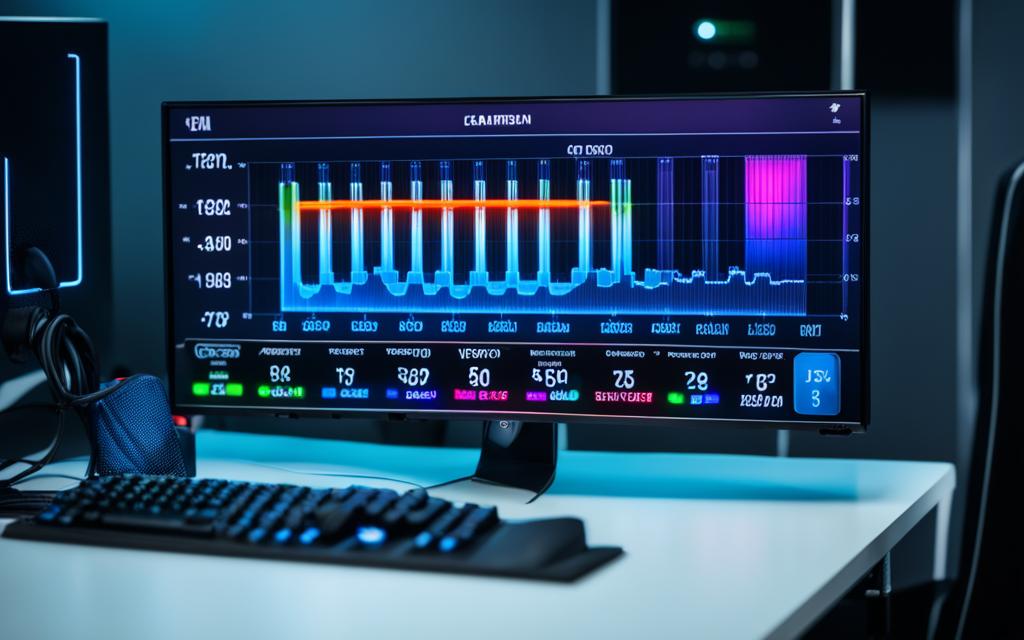Table of Contents
Knowing the optimal CPU temperature for gaming helps keep your CPU at top performance and makes it last longer. The ideal temperature boosts your gaming experience and keeps your hardware safe from heat damage. When gamers push their PCs hard, keeping the CPU cool is critical.
By keeping an eye on and controlling the CPU’s heat, your games will run smoother, and your system will be more reliable. To check your CPU’s temperature during gaming sessions, it’s a good idea to use certain tools and programs. You can find more information and suggestions for these tools in this useful guide here1.
Key Takeaways
- Optimal CPU temperatures are crucial for peak performance and system longevity.
- Understanding normal operating temperatures can prevent overheating.
- Regular monitoring leads to smoother gameplay and stability.
- Software tools assist in accurate temperature checks.
- Proactive temperature management is key to gaming efficiency.
Understanding CPU Temperature
Every gamer knows keeping a CPU at the right temperature is key for a great gaming experience. The CPU’s temperature and performance are closely linked, affecting how well gaming systems work. It’s important to know this to manage heat well and keep your gear in top shape.
The Role of CPU Temperature in Performance
CPUs work best within a certain temperature range. Normally, they should be between 30°C (86°F) and 40°C (104°F) for smooth running2. During heavy gaming, however, temperature climbs. An ideal range for gaming is between 75°C (167°F) and 80°C (176°F). But it’s crucial not to pass 85°C (185°F) to avoid damage2.
Going over this limit may cause thermal throttling. This means the CPU slows down to cool off, which can lower game performance3.
How CPU Temperature Influences Gaming Experience
High CPU temperatures can ruin gaming. Over 85°C (185°F) is troubling because it leads to crashes or hardware issues4. Getting the temperature under control is a must. Good airflow, cleaning your computer, and better cooling can make a big difference23. These steps help your games run smoother and keep your equipment safe.
| Condition | Normal CPU Temperature (°C) | Ideal Gaming Temperature (°C) | Critical Temperature (°C) |
|---|---|---|---|
| Idle | 30 – 40 | – | – |
| Regular Workload | 40 – 75 | – | – |
| Gaming | – | 75 – 80 | 85 (Critical) |
| Excessive Load | – | – | Above 85 |
Good cooling solutions do more than prevent damage. They boost your system’s performance and make your hardware last longer234.
What Should CPU Temp Be While Gaming
Knowing the normal CPU temp while gaming is key for gamers wanting to boost their play and keep systems lasting longer. A CPU’s temp often stays between 70°C to 80°C (158°F to 176°F) when gaming hard. Yet, it’s critical not to let temps go above 85°C to avoid performance degradation and possible harm56. Ideally, temps should be below 80°C for the best performance.
Normal Operating Temperatures during Gaming Sessions
The usual safe operating temperature for most CPUs falls between 61°C to 75°C, with a warning signal at 85°C7. Remember, room temperature and the quality of your case can really affect these numbers. Playing high-end games can make GPU temps rise, which also impacts how well your games run. Keeping an eye on your temps can spot issues early and stop heat from ruining your gaming.
Maximising Performance while Keeping CPU Cool
To keep your CPU cool, focus on better CPU cooling tactics. This includes improving case fan airflow and using top-notch thermal paste. Keeping your computer clean from dust and arranging cables properly helps air move freely, ensuring your CPU works at its best. It’s also smart to use apps like HWinfo. They let gamers see CPU and GPU temps in real time, helping them keep their systems safe during heavy gaming sessions6.
Identifying Good vs Bad CPU Temperatures
Knowing the right CPU temperatures is essential for its well-being. It helps you avoid damage. Most CPUs follow a common range, despite different models.
Average CPU Temperature Ranges Explained
CPUs typically run between 40°C and 80°C (104°F and 176°F) under normal use8. For demanding activities, like big games or heavy programs, temperatures can rise to 60°C–90°C (140°F–194°F)8. High temperatures over time might be a bad sign for the CPU.
Indicators of Overheating and Potential Damage
Spotting overheating early is key. Look out for crashes, frozen apps, or performance drops. These suggest your CPU may be too hot. If it often goes over 80°C (176°F), your CPU could get damaged8. Staying alert helps keep your device running well for longer.
How to Check Your CPU Temperature
Learning to monitor your CPU temperature is key for gamers and those using demanding software. Many effective ways exist to monitor your CPU’s heat, ensuring it runs safely.
Methods for Monitoring CPU Temperature
Using built-in BIOS tools is one method, offering a basic view of your CPU’s temperature at startup. However, this isn’t practical for everyday use because it requires restarting your computer. Third-party software, like Core Temp and NZXT’s CAM, provides an easier option. They let you see your CPU temperature in real-time, showing important info about load and speed to keep performance high.
Using Software Tools vs Hardware Monitoring
For accurate, ongoing monitoring, software is the best choice for ease of use and features. Core Temp shows live temperatures for each processor core, helping track changes over time9. HWiNFO offers detailed temperature data for various hardware, including the CPU9. In contrast, infrared thermometers give accurate temperature without stressing the CPU in heavy-duty tasks. This method balances performance and temperature management well.
| Monitoring Method | Advantages | Other Notes |
|---|---|---|
| BIOS Tools | Broad overview, no extra software needed | Not great for frequent checks; requires rebooting |
| Software Tools | Live data, easy to use, detailed | Try Core Temp, NZXT CAM, HWMonitor |
| Infrared Thermometers | Accurate, doesn’t burden CPU | Good for rare checks or intense use |
Consistently checking CPU temperature is vital to avoid damage and ensure your device lasts longer. Usage and the environment can impact how your device performs over time.
Using the right software makes tracking CPU health easier. It’s crucial for keeping your gaming setup or workstation running smoothly.
Choose the best methods to protect your device and keep performance high in challenging situations. Always watch your CPU’s temperature to prevent it from getting too hot1011.
Reasons for High CPU Temperatures
Knowing why your CPU gets hot is key to keeping your computer running well. Many things can make the temperature rise, which can slow down your games.
Common Causes of Overheating
Most of the time, CPUs get too hot because there isn’t enough cooling. Or, the computer’s airflow might be bad. Pushing your CPU harder than usual can also make it use more power and get hotter. It’s important to keep an eye on the temperature. The usual temperature when gaming is between 65 and 85°C. But it can jump to 90°C in heavy games12. If your processor stays cool, your games will run better. Up to 30% of gamers see their games slow down because of the heat12.
Impact of Dust and Ventilation on CPU Performance
Dust can seriously affect your CPU’s temperature. It blocks the air and stops the fans from cooling parts properly. Because of this, temperatures can get really high as heat gets trapped13. Cleaning regularly helps, as does making sure you have good air flow. Using dust filters can make a big difference. They cost about $50 and mean you don’t have to open your computer so much13. Also, liquid coolers cool better than fans but are pricier13.
Conclusion
Managing your CPU temperature well is key for the best gaming performance. It helps your games run smoothly and keeps your equipment in good shape. CPUs can work well up to 100°C, but it’s best to keep them below 80-85°C to avoid damage1415. Frequent checks and good cooling solutions, like affordable aftermarket coolers, can lower your CPU heat. This improves your computer’s running efficiency and reduces the risk of overheating16.
Gaming makes your computer work hard, so your CPU needs to be in top condition. Overheating can cause game lags and harm your PC parts, shortening their life15. To manage heat better, close apps you’re not using, make sure there’s plenty of air around your PC, and clean it often. These steps will help keep your CPU cooler, making your gaming smoother and more fun16.
An active effort to watch your CPU’s temperature and effective cooling are essential. Gamers need to focus on keeping their systems cool for the best performance and longer-lasting setups. A cool CPU means better gaming and a PC that stays healthy1415.
FAQ
What is the optimal CPU temperature while gaming?
A good CPU temperature for gaming is between 70°C and 80°C. It’s important to keep it under 90°C. This avoids damage and keeps your game running smoothly.
How does CPU temperature affect gaming performance?
A cooler CPU works better, making games run smoothly. If it gets too hot, it slows down. This can ruin your gaming experience.
What are normal operating temperatures during gaming?
When not in use, temperatures range from 30°C to 40°C. During gaming, they can go up to 60°C to 70°C. It’s key to keep within these ranges for your CPU’s health.
How can I identify if my CPU is overheating?
Signs of overheating include temperatures above 80°C, system crashes, or sudden slow performance. It’s crucial to keep an eye on CPU temperatures.
What methods can I use to check my CPU temperature?
You can check your CPU’s temperature with BIOS tools, software like Core Temp, or an infrared thermometer. Software options let you monitor without rebooting.
What are some common causes of high CPU temperatures?
High temperatures can come from dusty parts, bad cooling, or too much overclocking. Keeping your system clean helps keep it cool.
How can I improve ventilation for better CPU cooling?
For better ventilation, make sure fans are clean and working. Organising cables helps air flow and keeps your CPU cool during games.
Are there specific cooling solutions that work best for CPUs in gaming?
Air coolers and liquid coolers are great for cooling CPUs. The best choice depends on your gaming setup and needs.
Source Links
- https://www.noyafa.com/blogs/knowledge-base/good-cpu-temperature – What Is A Good CPU Temperature? A Guide to Keep Your Processor Cool
- https://www.shiksha.com/online-courses/articles/all-about-cpu-temperature-range/ – CPU Temperature Range That Must Be Maintained – Shiksha Online
- https://gadgetmates.com/normal-cpu-gpu-temperatures-for-your-pc – Normal CPU & GPU Temperatures For Your PC – GadgetMates
- https://www.lolvvv.com/blog/normal-cpu-temp-while-gaming – What is a Normal CPU Temp While Gaming?
- https://directmacro.com/blog/post/what-is-optimal-cpu-and-gpu-temp – What Is Optimal GPU Temp and CPU Temperature Range
- https://www.wepc.com/tips/optimal-cpu-gpu-temperature-gaming/ – What is a normal CPU & GPU temperature while gaming? – How hot is too hot?
- https://forums.tomshardware.com/threads/cpu-temp-70°-75°c-while-gaming.3590243/ – [SOLVED] – CPU Temp 70°-75°c while gaming
- https://www.linkedin.com/advice/3/what-normal-optimal-ranges-cpu-temperature-different – What are the normal and optimal ranges of CPU temperature for different types of processors?
- https://www.makeuseof.com/how-to-check-cpu-temperature/ – How to Check the CPU Temperature on Your Windows PC
- https://www.digitaltrends.com/computing/how-to-check-your-cpu-temperature/ – How to check your CPU temperature | Digital Trends
- https://www.pandasecurity.com/en/mediacenter/how-to-check-cpu-temp/ – How to Check Your CPU Temperature – Panda Security
- https://rog-forum.asus.com/t5/rog-gaming-notebooks/g751-jy-cpu-temperature-getting-warmer-and-warmer-to-90c/td-p/539093 – G751-JY CPU temperature getting warmer and warmer to 90C
- https://www.linkedin.com/advice/1/how-can-you-lower-your-cpu-temperature-too-high – How can you lower your CPU temperature if it is too high or overheating?
- https://www.pugetsystems.com/labs/articles/impact-of-temperature-on-intel-cpu-performance-606/ – Impact of Temperature on Intel CPU Performance
- https://blog.wtfast.com/blog/normal-cpu-temperature-while-gaming-know-when-its-too-hot – Normal CPU Temperature While Gaming: Know When It’s Too Hot — WTFast Blog
- https://www.hp.com/hk-en/shop/tech-takes/post/how-to-check-cpu-temperature – How To Check Your Computers CPU Temperature












